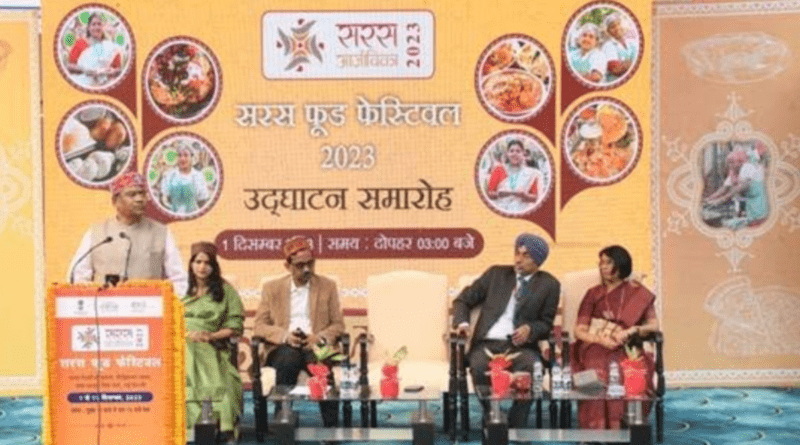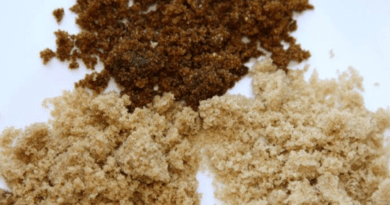New: Saras Food Festival, a celebration of entrepreneurship.
The Saras food festival, a convergence of traditional recipes, indigenous cuisines, cultures, and flavors, presents unique delicacies, specialties, and cuisines from over 21 states, showcasing the abilities of over 150 female entrepreneurs.
From December 1 to December 17, 2023, the Union Ministry of Rural Development will organize the Saras Food Festival at Handicraft Bhawan, Baba Kharak Singh Marg, Connaught Place.
This program is attended by 150 women entrepreneurs and self-help group members from 21 states around the country.
The 17-day festival intends to empower women on a national scale by showcasing them as entrepreneurs and members of self-help groups founded under the Ministry’s “National Rural Livelihoods Mission.”
People came to the festival not just for the food but also for the outfits.
“Many people are coming to taste a variety of food with their families,” . People are particularly enjoying moong halwa now that it’s cold.”
The event draws a sizable attendance, particularly in the evenings, thanks to the joyous mood provided by a small stage for performances.
Visitors to the festival are eager to learn about the preparation of various types of food from various states.
The festival features a wide variety of cuisines, including sticky rice with black chicken curry, black rice kheer, and sticky rice with mushroom curry from Assam; kair sagari, gatte ki sabzi, bajra roti, and pyaaz kachori from Rajasthan; fish curry from West Bengal; Hyderabadi dum mutton biryani from Telangana; and Malabar biryani from Kerala.
Visitors can also relish dishes from Arunachal Pradesh, Mizoram, Sikkim, Maharashtra, Uttar Pradesh, Andhra Pradesh, and Gujarat in the food festival.
SHG members, rural chefs, artists, and handicraftsmen and women gathered at Saras Gallery right after the IITF concluded at Pragati Maidan at the end of November—a strategic venue to host regional specialties because it is right next to the state emporiums, which showcase handicrafts and handlooms from the various states in the country.
The Saras Aajeevika festivals (melas) in Delhi celebrate Indian handicrafts, handlooms, indigenous skills, and regional delicacies. Handicrafts, Pashmina, and Aari needlework from Jammu and Kashmir are shown in a distinct pavilion during this festival edition. Kashmiri Kahwa tea with saffron, dry fruits from the state, and the traditional “Namak ki chai” or Noon chai are among the indigenous specialties found here.
Saras, which is decorated with magnificent lights and lanterns hanging from old historical trees, showcases innate entrepreneurial talents and supports rural food entrepreneurship from across the country. Special chai and litti chokha from Bihar, Rajasthani gatte ki sabzi, seasonal makke ki roti and sarson ka saag with gur from Punjab, Kashmiri kahwa tea and “namak ki chai” or noon chai, tea from Assam, and black rice kheer are some exciting recipes to try. Khurja, Uttar Pradesh pottery works, Channapatna toys from Karnataka, and Madurkathi mat works from West Bengal are among the other stalls displaying handicrafts.
Overall, the festival’s management of engaging an engaged populace opens up new possibilities. Makeshift washbasins, dining areas, announcements encouraging people to try new cuisines, information about traditional recipes, and a testimonial board with visitor messages are all welcome steps toward making the festival truly participatory while ensuring interaction among people and rural SHG members. These festivals also raise awareness about rural livelihoods and educate citizens about women-led entrepreneurship and the value of traditional or homemade food, which serves as an important lobbying tool.
Perhaps more stalls and kiosks encouraging other women enterprises engaged in preparing other delectable delights such as jams, pickles, and forest produce could have been showcased in festivals such as those organized by the IITF, Surajkund, Delhi Haat, and Saras Aajeevika, which promote a diverse range of products. Having Indian specialties all under one roof is a great move toward furthering the goals of projects such as ‘Ek Bharat Shreshtha Bharat,’ which encourages cultural exchanges and integration while supporting women-led companies and cultural capital.




